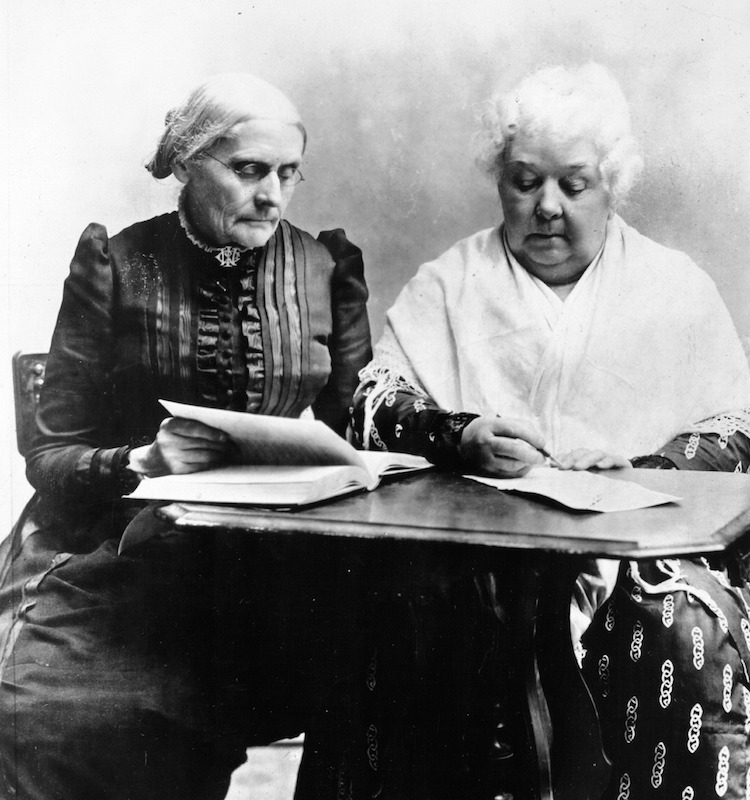
The crate full of papers didn’t look like anything special when George and Libbie Merrow found it in their Connecticut attic. Inside, however, was a treasure trove of papers that had belonged to the suffragist Isabella Beecher Hooker in the 19th century. Now, in the collection of the University of Rochester, the letters — from other suffrage icons, including Susan B. Anthony — are a window into the day-to-day workings of the movement for the enfranchisement of women.
Hooker — whose father was Rev. Lyman Beecher and whose half-siblings included Henry Ward Beecher, Catharine Beecher and Harriet Beecher Stowe — received the letters in the Rochester collection in the years between 1869 and 1880. (Though the papers were acquired by Rochester in late 2016, the university — which is based in the city where Anthony is buried — has only just begun publicizing the collection, having spent months organizing and reviewing it.)
At least one of those letters, as seen in the gallery above and transcribed below, is a double whammy of suffrage history: Sent to Hooker in October of 1869, it was written by both Susan B. Anthony and Elizabeth Cady Stanton, two leaders of the women’s suffrage movement. The change in handwriting is clearly visible near the top of the third page.
Jessica Lacher-Feldman, an assistant dean and director of the university’s rare books and special collections department, has explanations for many of the references made throughout the letter. She believes that Anthony and Stanton were writing to Hooker to discuss a suffrage convention that was held in Hartford, Conn., later that month, and who would be invited to speak. The Mrs. Wilbour referenced would have been Charlotte Beebe Wilbour, president of the Sorosis women’s club; Mrs. Celia Burleigh was the first woman ordained a minister in the Unitarian church; Mrs. Livermore was Mary Livermore, founder of the suffragist paper The Agitator; Mr. Tilton was a writer, abolitionist and assistant to Henry Ward Beecher (until the 1870s, she says, when Henry Ward Beecher and Mrs. Tilton were accused of an affair).
“I particularly love Stanton’s P.S., which are words to live by in my book,” Lacher-Feldman tells TIME in an email. “[It is] a testament to cooperation and collaboration needed in the challenges that these women faced head-on.”
Monday eve’g Oct 11. 1869
Dear Mrs. Hooker
Just in from the St. Louis Convention – a splendid success – Mrs Stanton in too. We’ve read your note just here. Both say yes to Mrs Wilbour – Pres. of the Brooklyn (Connecticut) W.S. association – she is a beautiful writer & good reader — & her presence is very very good – superior.
Mrs. Livermore will probably say yes to you – she is coming to Boston soon – told me they – the Boston people had organized a Stock Company for a newspaper – of $10,000 — & were going to buy her Agitator – she coming on to make bargain – may come east to live, lecture & edit the paper.
Mrs. L. has evidently given in her fullest allegiance to the Boston movement for a new association.
Mrs. Stanton says be sure & invite Mr. Tilton he & his precious little wife would not only be ornamental but very useful.
(Susan B. Anthony, unsigned)
[Note: The letter changes here from Anthony’s handwriting to that of Elizabeth Cady Stanton]
I would rather leave all resolutions and arrangements to you and only take on myself the responsibility of a speech. It is so pleasant to think that younger heads will do all that is necessary. Can you possibly put your convention one day later as my neice (sic) is to be married and she will put the wedding one day earlier so that I can reach Hartford.
in haste
E.C.S.
P.S. Whoever you invite will be agreeable to me. I can speak and work with all the children of men
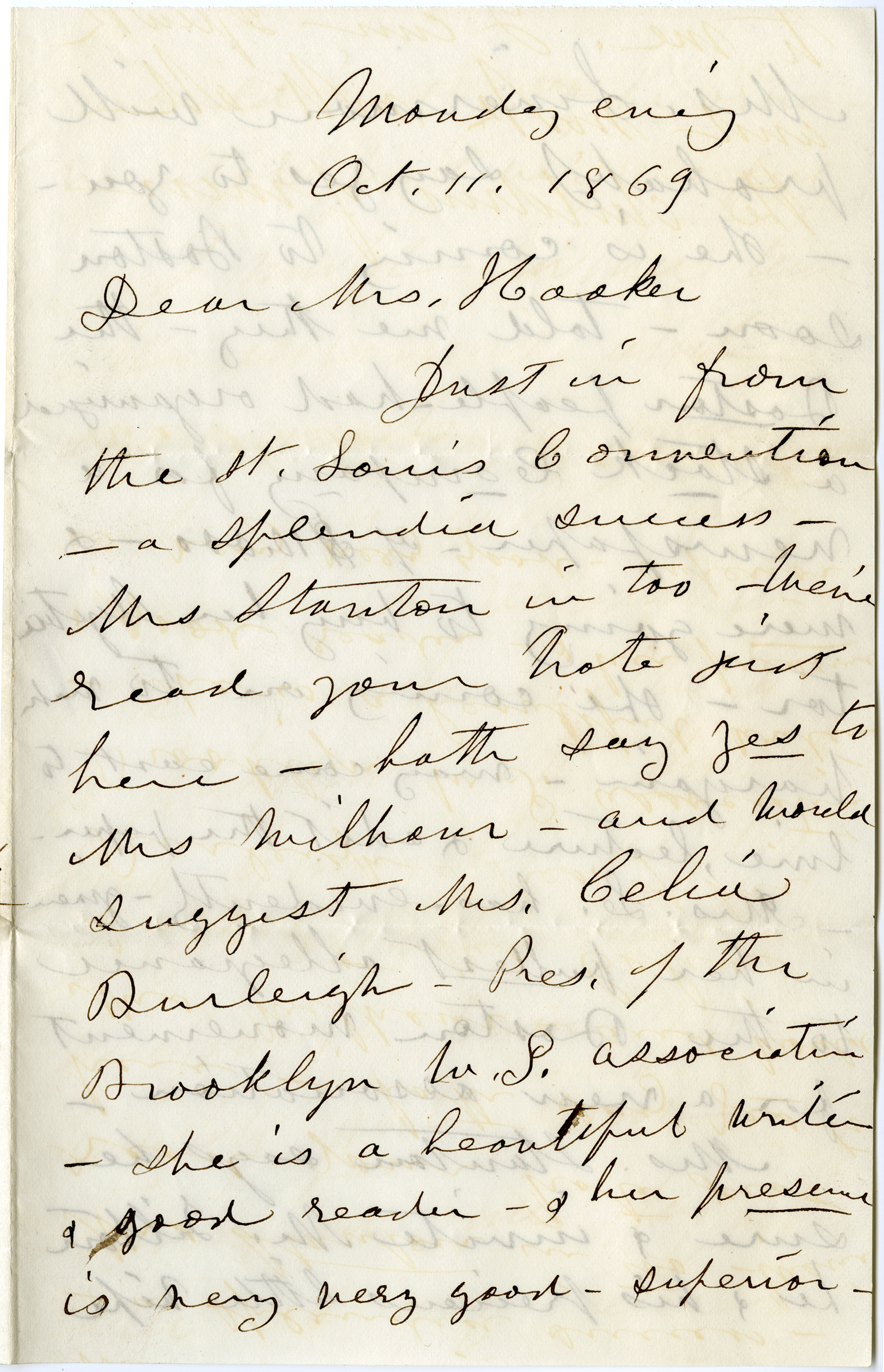
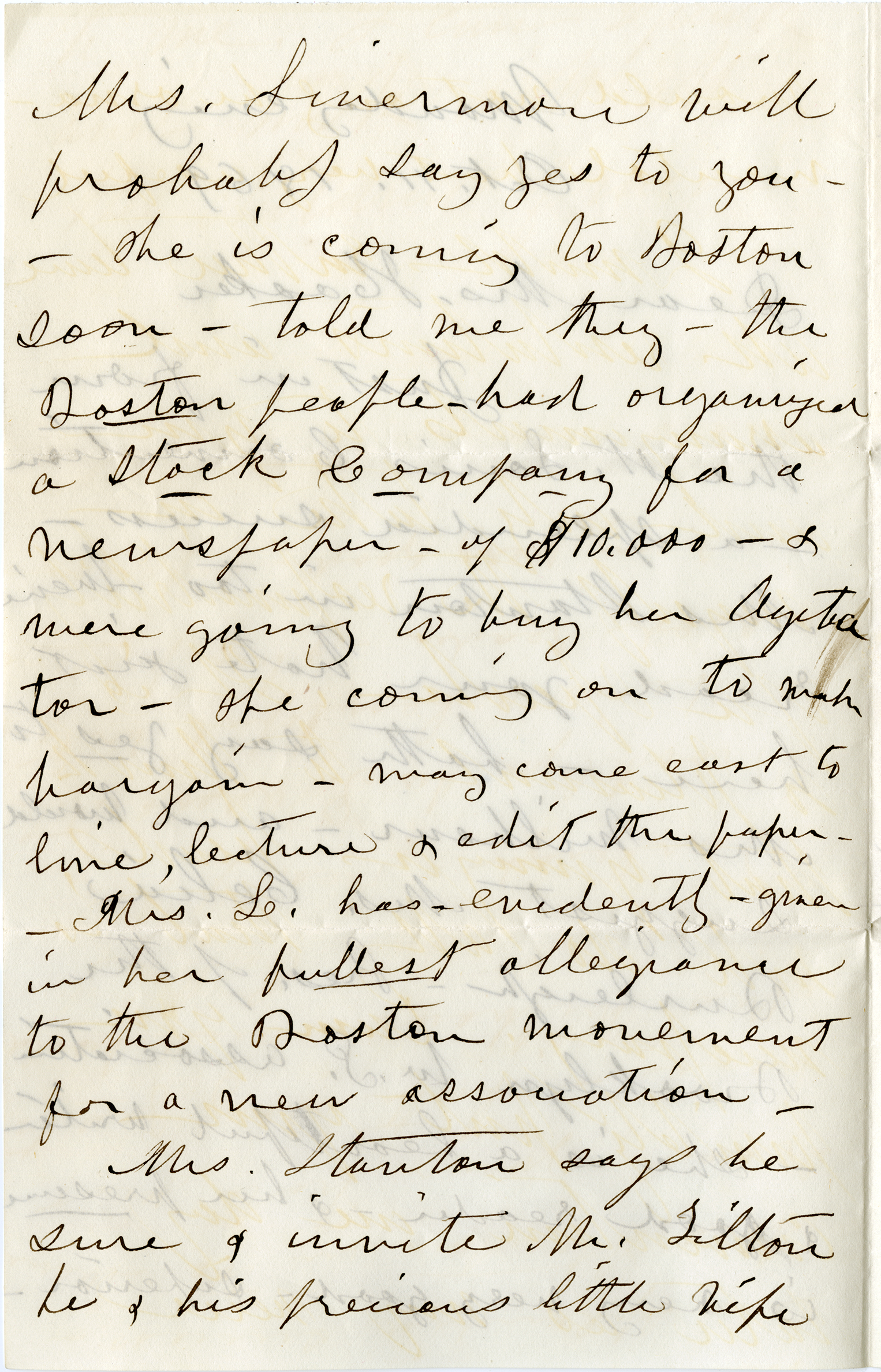
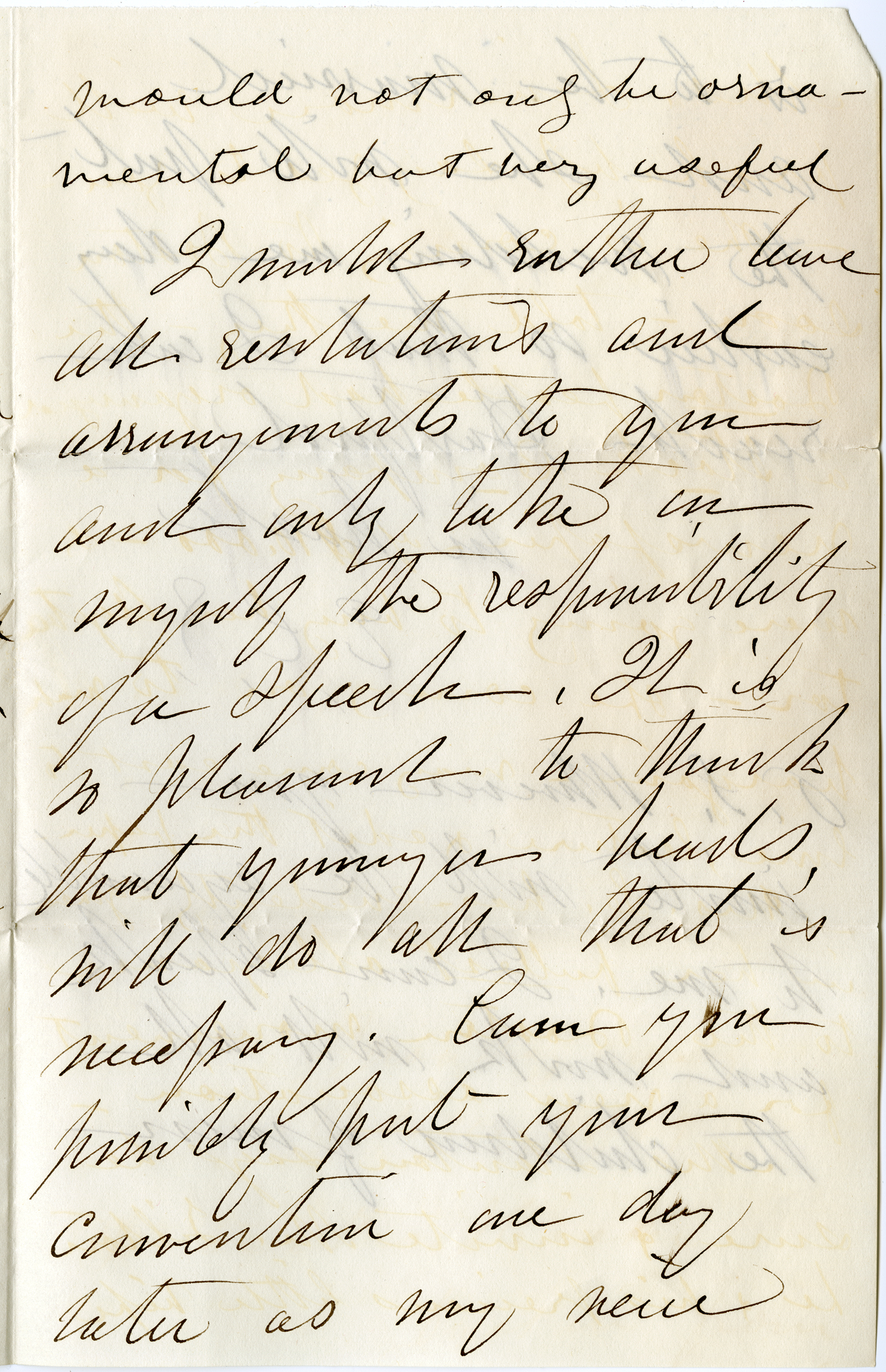
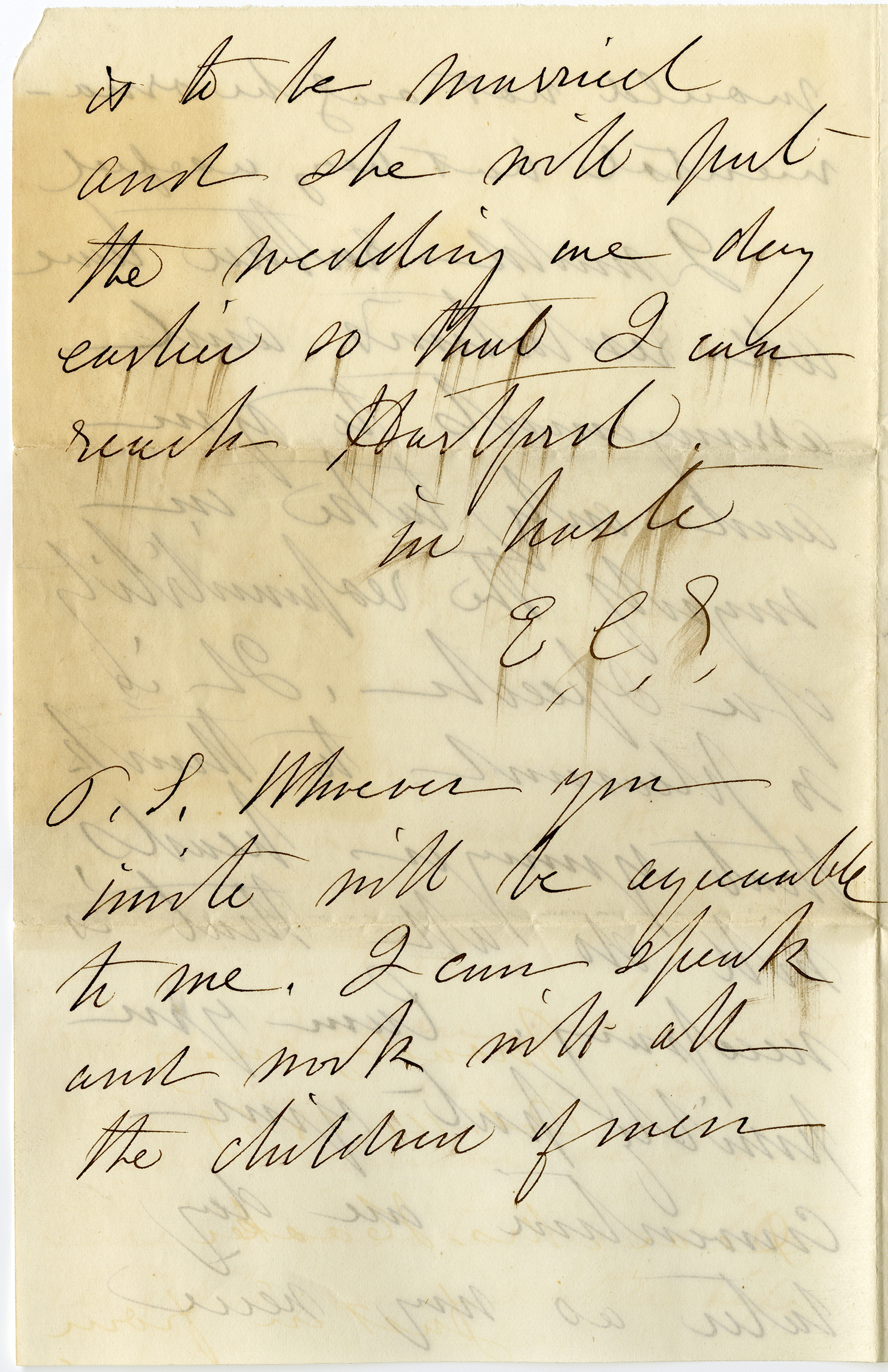
More Must-Reads From TIME
- What Student Photojournalists Saw at the Campus Protests
- How Far Trump Would Go
- Why Maternity Care Is Underpaid
- Saving Seconds Is Better Than Hours
- Welcome to the Golden Age of Ryan Gosling
- Scientists Are Finding Out Just How Toxic Your Stuff Is
- The 100 Most Influential People of 2024
- Want Weekly Recs on What to Watch, Read, and More? Sign Up for Worth Your Time
Write to Lily Rothman at lily.rothman@time.com